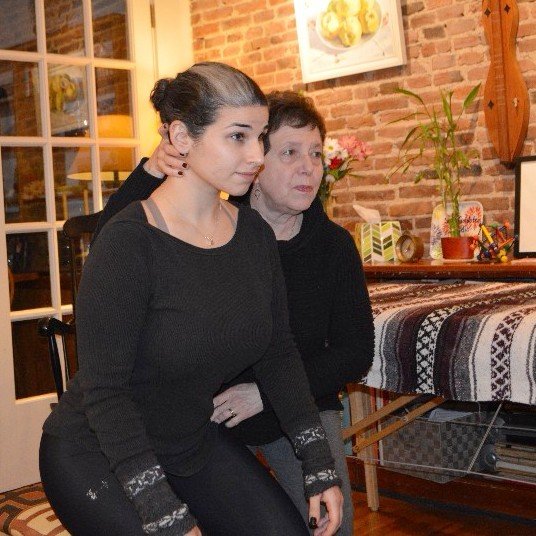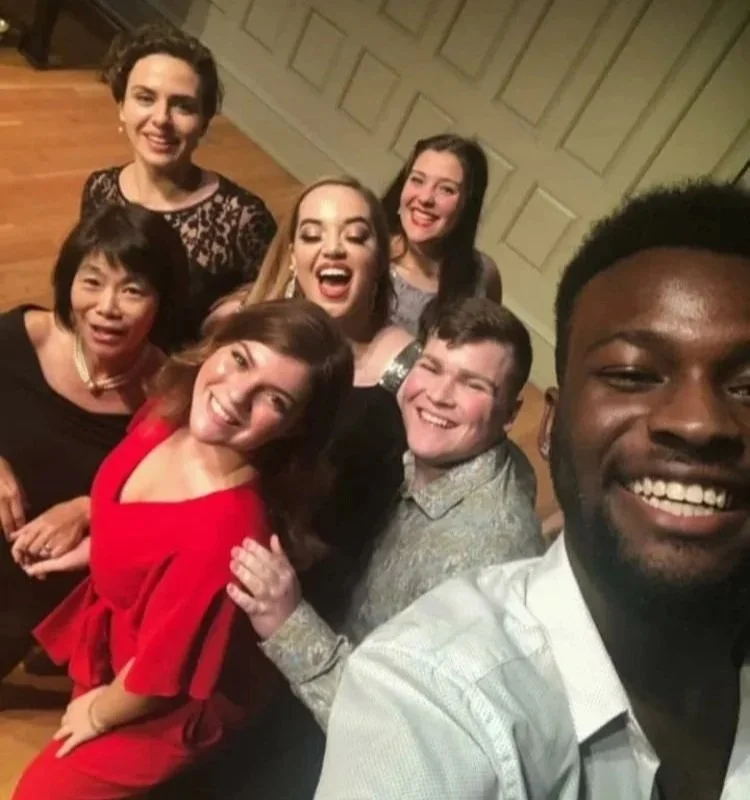Greetings in the New Year • Jan. 2020
Sara Goldstein Studio
BOOK A LESSON
Email me with your availability to book a lesson!
REFER A FRIEND
News from "Up Here" • January Update
Hello Friends,
Greetings! It's a new year and a new decade. This newsletter comes with wishes for a happy, healthy year ahead to each of my subscribers. Please pass the word!
ON TOUCH
SENSORY LEARNING
In December I finished a semester of teaching my class at the conservatory. The Alexander Technique is often taught with hands-on. It is an honor to work in this way with students in class, in my voice studio, and in my Alexander studio.
It's a quiet thing. A moment of listening to the student, the student to themself, and my hands supporting the student in that moment of sensing and learning.
The issue of touch has taken on new meaning in a time where we are asked to include wording about the conservatory's harassment policy in our syllabi. What does that mean for an Alexander Technique teacher? First, It means there has to be a conversation about consent. The environment of my class is a good place to have this conversation. Students are learning to tune in to sensations and reactions and to put these into words. And this conversation needs to happen, and to be revisited periodically during the semester.
TRAINING AND TEACHING
Alexander Technique teacher training is a three-year process. And in my teaching association, Alexander Technique International (ATI), at the end of the third year, trainees are observed teaching and asked to respond to questions by three qualified sponsoring teachers before they can be certified. The responsibility of the teacher to their students is not taken lightly.
When I first became interested in teaching AT, I wanted to learn how to use my hands in that uniquely expansive way that was difficult to put into words. When I began training I understood that it is not the hands. It is how the teacher is using themself that makes the teaching meaningful and effective.
The first rule in AT hands-on teaching is for the teacher be in a non-reactive, self-aware state before and during a lesson.
We ask for nothing. We are inviting the student to sense what it is like to remove interference from their way of being and doing; to acknowledge the power of their inherent poise, mobility and most important, to connect with themselves in a state free from reaction. With our hands we are holding space for a person to discover what shows up in a non-doing manner. In my training with Tommy Thompson he said, this work is about a person's potential, and Touching Presence, the title of his recently published book.
Teachers in all fields wish to guide the learning for the student. But in an AT lesson, the depth of the teacher's listening and the absence of demanding something from the student make it unique. The student may choose whether or not to have hands-on teaching. Indeed, a great deal can be learned through verbal interaction, activities and discussion. But the power of a refined and clear touch is unmatched!
In a time of pervasive technology and the isolation that comes with constant screen time, human touch is needed more than ever in our lives. The unique quality of AT touch can be described as a thought-infused sensory conversation. In my teaching I am always working to engage respectfully, effectively and gratefully with my students.
KEEP IN TOUCH
In the new year, give some thought to when and why and how you touch or are touched by others. What is being expressed? Can you touch with authenticity? Can you touch when you might not normally do so?
I've read recently about how deprived of touch the elderly are in our culture. Can you bring the beauty of touch to someone who might need it? Can you also sense when it might not be appropriate to touch another person even though you might not have realized it before?
Best wishes for you to touch and be touched by your experiences in the year ahead!
ABOUT THE ALEXANDER TECHINQUE
The Alexander Technique helps us to function in harmony with our natural design and with greater efficiency and ease. Alexander lessons are recognized as a valuable resource to people of all ages, including performing artists, athletes, anyone with chronic or incidental pain or just wishing to improve wellbeing.
Book a Lesson with me, or Learn More on my website.




